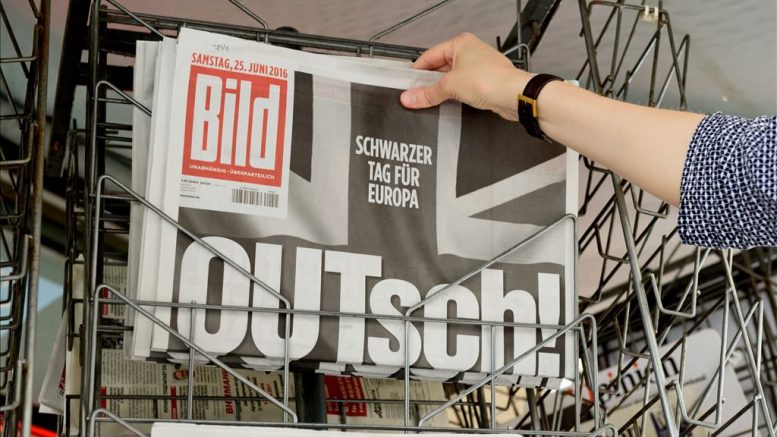Any attempt to undercut long-established European standards would be an effective declaration of economic warfare, writes Geoff Kitney.
Amid the raucous and sometimes ill-tempered hubbub that has characterised the Brexit debate one sentence stands out as both outrageous and revealing.
It appeared on the Leave.eu website and it says this: “We didn’t win two world wars to be pushed around by a Kraut”.
The “Kraut” referred to was German Chancellor Angela Merkel and the filthy shot at her was written by someone from the extreme fringe of ultra-Brexitism.
The post appeared after news reports quoting Downing Street sources said Chancellor Merkel had told British Prime Minister Boris Johnson that Northern Ireland would have to remain in the EU Customs Union “forever” for there to be any chance of an agreement with the EU.
This was on October 8 and the issue of the Northern Ireland backstop was threatening to send the UK plunging towards a “No deal Brexit”. As we now know, the UK and the EU both compromised and agreed to an odd arrangement for Northern Ireland that leaves it effectively straddling a future with one foot in Europe and the other in the UK. It is a deal which is seen as a potential step towards Northern Ireland leaving the UK.
The “Kraut” posting was taken down within hours of its publication, with Aaron Banks – the founder of Leave.eu – conceding that it was offensive and unacceptable. Leavers queued up to condemn the words and distance themselves from its sentiment.
But the fact that it did appear, that initially at Leave.eu it was seen as an acceptable thing to be posted on the website, gave an insight into the way the Brexit mind works.
What might be called “the German problem” has always been at the heart of the UK’s problem with Europe and its membership of the European Union.
As someone who has lived in both Germany and the UK it has always struck me that the history of the 20th century wars between these two great European powers continues to be a deep factor in the reluctance of Britons to embrace the geographical reality of their existence.
In my experience, it is much more a factor in British minds than German minds.
It suddenly brings into sharp relief the reality of the world that the UK will enter as a lone power, outside of any trading block, fighting for advantages in a world dominated by the great economic powers – the US, China and the EU.
In countless conversations in my years living in Germany I was asked – as someone from an English background – whether I thought the British would ever put this dark period of history behind them. The concern of German friends was that, until this happened, it would not be possible to have a “normal” relationship. I lost count of the number of times that these people said they were concerned that this might ultimately be a factor in a UK decision to pull out of the EU.
And almost invariably, German friends expressed the hope that this would never happen. Britain’s continued presence in Europe was, to their minds, vital for future good democratic and economic health of Europe.
A few weeks ago, I was back in Germany and those same friends no longer expressed those sentiments. Brexit fatigue now runs deep across Europe. Like many in the UK, even many who had expressed the hope that Britain would change its mind and remain, they just want the whole Brexit business over and done with.
A retired senior German business executive expressed it this way: “I am sad about it, but I think it would now be best for Brexit to happen as soon as possible. Britain and the EU need to accept and adjust to the change. It will be a big change, with many complications, with dangers for both Britain and Europe. Too little attention has been paid to what happens after Brexit. We need to move onto that next stage and manage the consequences of the change. I think no-one has properly prepared for that.”
It is a matter of fact that the great, never-ending Brexit battle between the executive government and Parliament in the UK has been a battle of day-to-day tactics rather than a contest of analysis and ideas about what happens after Brexit.
There are many aspects to this important question but one which was raised by the person referred to as “a Kraut” is a particularly striking one.
Speaking to the German parliament during a Brexit debate, Angela Merkel remarked that Germany would have to think differently about the UK after Brexit.
Britain would cease to be a partner and would become an “economic competitor on our doorstep”, Merkel said.
Britain, instead of being a partner, would be like China and the US in seeking to gain advantages in the global trading system – even if Germany wanted to keep close economic, foreign and security co-operation and friendly relations.
Put this way, it suddenly brings into sharp relief the reality of the world that the UK will enter as a lone power, outside of any trading block, fighting for advantages in a world dominated by the great economic powers – the US, China and the EU.
It puts into perspective the Pollyannaish reassurances of Brexiters that Britain, free of the “colonial yoke” of its membership of the EU, will transition to the sunlit plains of free-trade and export driven wealth. It’s the great promise of Brexit, asserted with rock-solid certainty but based on flimsy facts and assertions.
‘Too little attention has been paid to what happens after Brexit. We need to move onto that next stage and manage the consequences of the change. I think no-one has properly prepared for that.’
German officials said that Merkel‘s warning was based on the prospect that post-Brexit Britain, under Boris Johnson, would abandon the commitment which his predecessor Theresa May had given to maintaining a “level playing field” – which would keep the UK aligned to EU rules on competition, tax, labour, social and environmental standards.
The “level playing field” commitment from the UK was moved in the Johnson Brexit deal from the binding Brexit Legal Agreement to the non-binding associated political declaration.
Last weekend, the UK media reported the contents of a leaked UK ministerial paper which indicated that Johnson would not stick to the ‘level playing field” undertaking.
Reported to be a paper prepared for ministers by the Brexit department, Dexeu, with input from the Prime Minister’s office, it said that the UK would be open to “significant divergence” from a level playing field with the EU.
German officials warned that any attempt by the UK to undercut EU standards would make it impossible for the EU to agree to a free trade agreement (FTA) with the UK.
- Michel Barnier tells UK: ignore EU regulatory standards at your peril. The Guardian, Oct 29
- Free trade deals undermine sovereignty. Financial Review, Oct 30
The rhetoric of the Johnson government – and now, apparently, its post-Brexit thinking – seems to indicate that it wouldn’t particularly care if a UK-EU FTA did not happen.
For Britain to walk away from a FTA with the EU and attempt to undercut long-established European standards would be an effective declaration of economic warfare.
It is worth recalling that it was divergent standards of labour market and other practices that were the reason that French President Charles de Gaulle vetoed Britain’s attempts to join the EU, commencing in 1963 and not succeeding until 1973.
It is also interesting to contemplate that it was Britain’s membership of the EU (initially the European Economic Community) which brought the UK and Germany together as economic partners. If Brexit results in a complete break between Britain and the EU (that is, with the collapse of any chance of a UK-EU Free Trade Agreement) the framework for that partnership will no longer exist.
Of course, it would be absurd to speculate that this might ultimately result in a repeat in the 21st century of the history of the 20th century.
However, far right extremists have regained a foothold in European politics in recent years, an especially worrying development in Germany.
A German friend told me that one of his great concerns about Britain’s departure from the EU was that it took out of the EU the most powerful and vigilant defender of democratic values.
“Britain’s democratic history carried great weight in Europe,” he said. “To lose it is not a good thing. But I don’t think the Brexit people have ever thought about that.”

Headline image credit: Shutterstock.com




